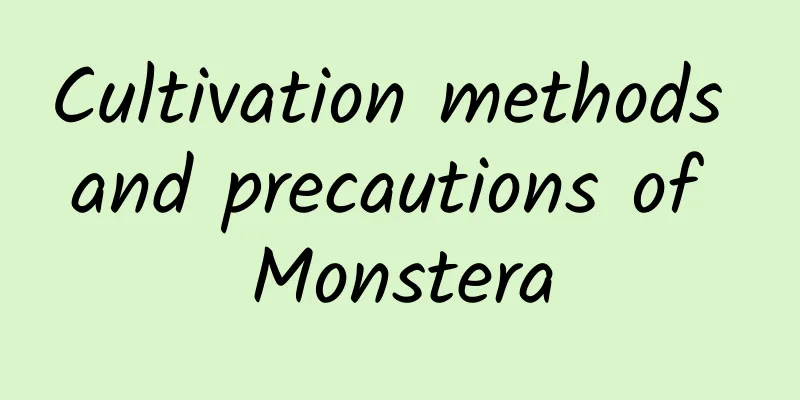Cultivation methods and precautions of Monstera

|
The leaves of Monstera are shaped like tortoise shells, and the stems are like bamboo stems. The leaves are peculiar in shape, dark green, and shiny, with cracks in the holes, which look very much like a tortoise's back. It is a very popular foliage plant at home and abroad. How to grow Monstera1. Lighting Monstera prefers a warm and humid environment, avoids drought and direct sunlight. Otherwise, it is easy to cause dead leaves. In summer, it should be placed indoors or under a shade shed, not on the balcony where the sun is too strong. In winter, when the temperature drops to 6℃, it should be moved indoors to keep warm. 2. Watering Monstera needs enough water, and the culture soil must be kept moist at all times. Water it once in the morning and evening in summer to keep the air and leaves bright. Water it once every 3-4 days in winter. Water it daily, once a day. 3. Fertilization Monstera prefers fertilizer, so it needs to be fertilized appropriately. Apply diluted liquid fertilizer twice a month from April to September. Sufficient fertilizer will make the leaves look nice. 4. Pests and diseases Scale insects are prone to appear on the stems and leaves of Monstera, so they should be prevented and treated in time. You can use an old toothbrush to clean it and then spray it with 1000 times diluted 40% omethoate. 5. Repotting Monstera needs to be repotted once a year, preferably between March and April. Things to note when growing MonsteraLikes warmth and dislikes severe cold Monstera prefers a warm environment and avoids freezing weather. It will not be damaged by freezing when the temperature is above 5℃, and grows well when the temperature is above 12℃. Prefers shade and avoids strong light Monstera has strong shade tolerance, grows rapidly and vigorously, has well-developed aerial roots, and has large leaves with bright dark green color. Likes moisture and dislikes waterlogging Monstera prefers a humid environment. There is a lot of rain in the south, and if waterlogging lasts too long, the roots, stems and leaves will rot. Prefers fertile soil and dislikes lean soil Monstera likes fertile soil, especially fertile sandy loam. Although it can grow on lean red-yellow soil, its growth will be weaker, the tree posture will be deformed, the leaves will become smaller, and the leaf color will become lighter, affecting the ornamental effect. Prefers soil fertilizer and dislikes chemical fertilizer Monstera is often fertilized with organic fertilizers, such as cake fertilizer, artificial organic fertilizer, livestock and poultry manure, and soil fertilizer. The tree is strong, its leaves are as big as plates, the leaves are thick, the leaf color is dark green and shiny, and the tortoise shell pattern is especially clearer. |
<<: Jasper cultivation method and precautions for Jasper cultivation
>>: How to grow fuchsia? Growing methods and techniques of fuchsia
Recommend
The harm of hawthorn leaves and the taboos of soaking hawthorn leaves in water
Hawthorn leaves are the leaves of the hawthorn tr...
How to distinguish kale and choy sum? The difference between kale and choy sum
When I went to the market to buy vegetables, I fo...
How to eat purple bananas? The benefits and functions of purple bananas
Bananas are very nutritious fruits. The skin of u...
The benefits of grapefruit oil
Grapefruit is a healthy fruit with a sweet and so...
The efficacy and function of freshly squeezed orange juice
Every winter, oranges are available in large quan...
The efficacy of Chinese cabbage porridge
How much do you know about the effects of Chinese...
The advantages and disadvantages of eating kiwi fruit and the taboos of eating kiwi fruit
Every autumn is the time when kiwis mature and ar...
How is El Mercurio de Chile? Reviews and website information of El Mercurio de Chile
What is the website of El Mercurio Chile? El Mercu...
What are the four famous pickled vegetables in China?
Everyone must eat pickled vegetables frequently, ...
What is Lauren Conrad like? Lauren Conrad reviews and website information
What is Lauren Conrad's website? Lauren Conrad...
The efficacy and function of collagen
In the past, many women who love beauty liked to ...
What is TJX Companies like? TJX Companies reviews and website information
What is TJX Cos? TJX Cos is the largest first-line...
Ingredients and methods of stir-fried eggplant, green pepper and cowpea
Today I would like to introduce a dish to you. Fr...
Chuck E. Cheese's reviews and website information
Chuck E. Cheese's is an American indoor amusem...
Pumpkin and mung bean soup recipe steps
Pumpkin and mung bean are both common ingredients...









